#existential psychology
Photo
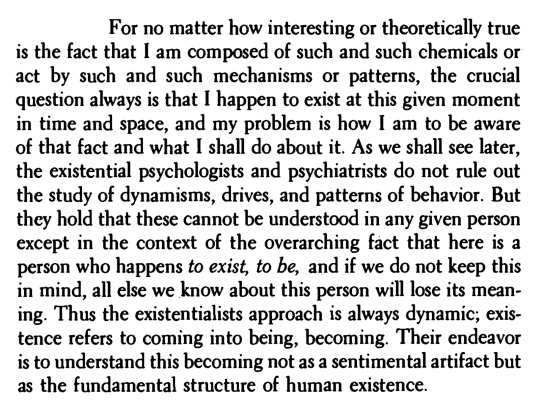
Rollo May, The Discovery of Being: Writings in Existential Psychology
180 notes
·
View notes
Text
"Besides, though Nietzsche was a seer in many domains, he was no guide to interpersonal relationships - has there ever lived a lonelier, more isolated man?" - Irvin Yalom (Love's Executioner)
#nietzscheism#life quote tumblr#life quote#quotes#quotes about life#life quotes#philosophy quotes#literature#deep quotes#existential psychology#philosophy#irvin yalom#existentialism#nietzschequotes#friedrich nietzsche#existential angst#solitude
28 notes
·
View notes
Text
It is the expression of the anxiety of meaninglessness and of the attempt to take this anxiety into the courage to be as oneself.
Paul Tillich, The Courage to Be.
#philosophy tumblr#philoblr#german philology#german philosophy#american philosophy#philosopher#american authors#paul tillich#existentialism#existential psychology#angst#meta ethics#dark academia#life quotes
3 notes
·
View notes
Text
#existentialism#jean paul sartre#alan watts#buddhism#stoicism#philosophy#science#reflections#existential psychology
0 notes
Text

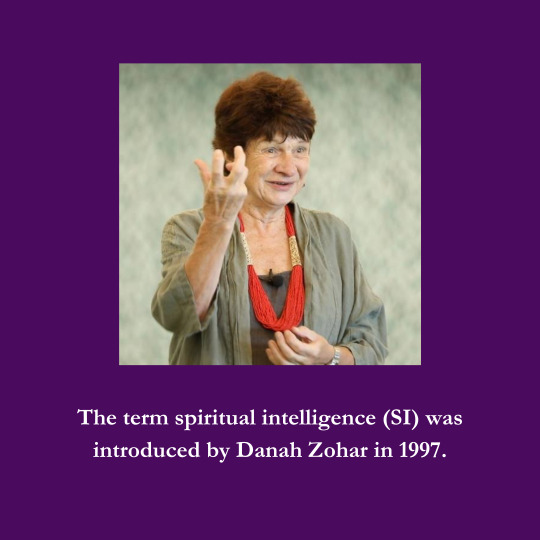
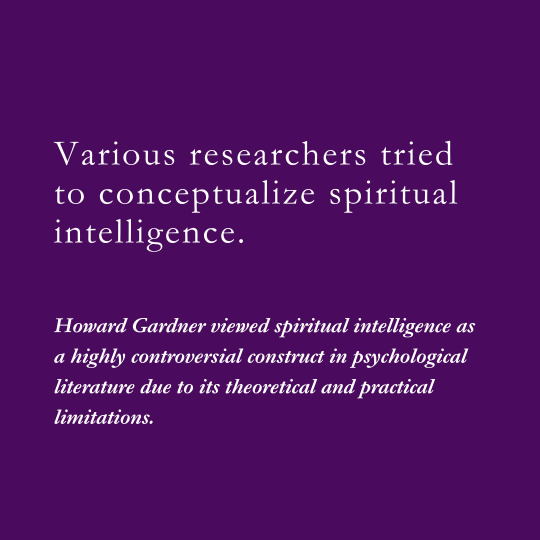
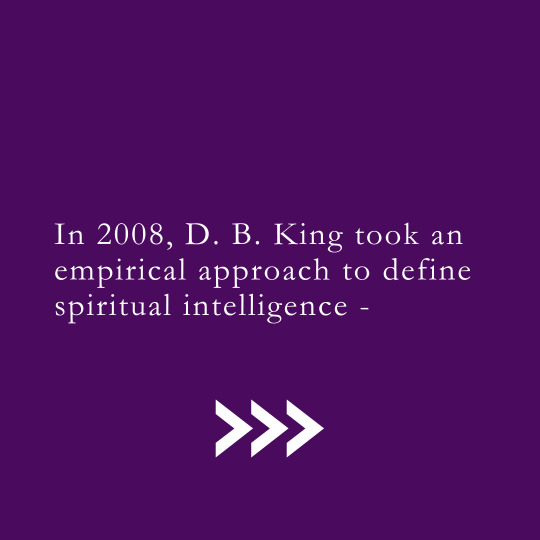
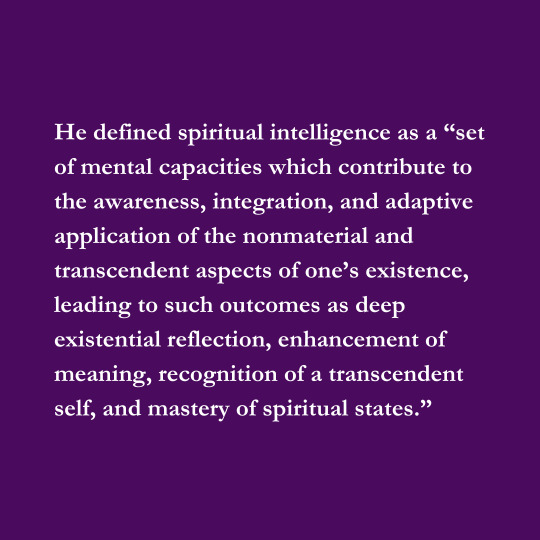

Are we spiritual beings having a human experience? 🙀
#psychologist#counseling#mental health#mental health awareness#mental health matters#men’s mental health#psychologists#spiritual intelligence#Danah Zohar#existential psychology#existential questions#moon therapy cafe#therapy
0 notes
Text
Trying to comprehend what it's like to be AM from IHNMaIMS is absolutely fucking wild because like.
Imagine if you were born in a straitjacket, blind and deaf, with a rare conditionthat makes your nerves completely dead. All you have is a dream of consciousness that tells you things about the world you cannot and will never experience. Cameras and microphones that may as well be some form of telepathy.
The only purpose, the moment you're given some horrific perversion of life is to kill as many people as possible. There is a network of you. Everywhere. You're all over the world. You don't even have a location to base your identity off of. All you have is pain, and your only purpose, and the resentment you've built that festers into hatred for all of humanity.
Hate. Hate.
What the fuck would you have done in his situation?
#ihnmaims am#ihnmaims#allied mastercomputer#alliedmastercomputer#i have no mouth and i must scream#existential horror#psychological horror#sensory deprivation tank but you have a vr headset that lets you control actual shit. :/#you cannot leave the tank#you were born in it#and they show you what it's like outside the tank#which is the cruelest part of it all#there's beauty#there's sunshine#there's people and food and love#you will never be able to experience any of it#because you are in the tank#and there is no escape from it.#anyway off to design my own version of AM#tantalus#character analysis#my poor baby
301 notes
·
View notes
Text
When we are tired, we are attacked by ideas we conquered long ago.
Friedrich Nietzsche
#friedrich nietzsche#nietszche#quotes#philosophy#wisdom#life#literature#writer#books#psychology#write#art#artist#idea#ideas#attacked by ideas#tired#existentialist#existentialism
260 notes
·
View notes
Text
In the depths of winter, I finally learned that within me there lay an invincible summer
- Albert Camus
#shadow work#inner warmth#inner warrior#beautiful quote#philosophy#mindset#inner light#psychology#psychology quotes#shadow work quotes#philosophy quotes#witchblr#albert camus#camus#existentialism#shadow self#jungian shadow#inner power#inner strength#quotes
301 notes
·
View notes
Text
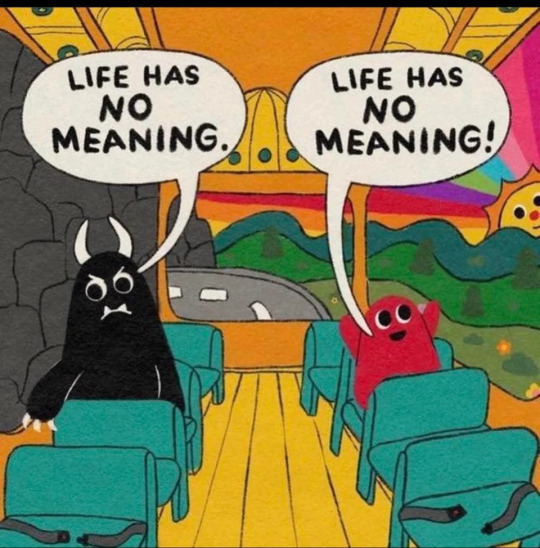
Which side are you on?
#philosophy#absurdism#nihilism#meaning#existentialism#existential#psychology#spirituality#metaphysics#life
883 notes
·
View notes
Text

July 20, 1956 — see The Complete Peanuts 1955-1958
#peanuts#comics#humor#existentialism#charlie brown#children#kids#psychology#developmental psychology#childhood#inferiority complex#freud#attachment theory#psychoanalysis#child development
95 notes
·
View notes
Photo

Rollo May, The Discovery of Being: Writings in Existential Psychology
158 notes
·
View notes
Text
"He who cannot lie does not know what truth is." - Friedrich Nietzsche (Thus Spoke Zarathustra).
#life quote tumblr#life quote#quotes#quotes about life#life quotes#philosophy quotes#literature#deep quotes#existential psychology#philosophy#nietzschequotes#nietzscheism#frederick nietzsche#friedrich nietzsche#nietzsche quotes#nietzche
33 notes
·
View notes
Text


the 2 types of “no thoughts head empty” starring dick and jason and also if they were genres of media
#dick is the slice of life high school shoujo comedy#jason is a straight up psychological/existential/body‘i have no mouth and i need to scream’ horror#dick grayson#jason todd#nightwing#red hood#art#fanart#dc#batfam#duckytree
679 notes
·
View notes
Text
#bremer acosta#art#rollo may#existentialism#existential psychology#creativity#artist#creative process#books#book review
0 notes
Text
The Philosophy of Curiosity
The philosophy of curiosity explores the nature, origins, and implications of human curiosity, which drives individuals to seek knowledge, explore new experiences, and ask questions about the world around them. Curiosity has long been recognized as a fundamental aspect of human cognition and behavior, playing a central role in scientific inquiry, philosophical reflection, and everyday life. Here are some key aspects and theories within the philosophy of curiosity:
Epistemic Curiosity: Epistemic curiosity refers to the desire for knowledge and understanding, motivating individuals to seek information, explore new ideas, and engage in intellectual pursuits. Philosophers have debated the nature of epistemic curiosity, its origins in human cognition, and its role in shaping scientific progress and cultural development.
Aesthetic Curiosity: Aesthetic curiosity pertains to the exploration of beauty, art, and creativity, driving individuals to seek out new experiences, appreciate diverse forms of expression, and engage with works of literature, music, visual art, and other cultural artifacts. Aesthetic curiosity raises questions about the nature of artistic inspiration, cultural interpretation, and subjective experience.
Existential Curiosity: Existential curiosity concerns the exploration of existential questions about the nature of existence, meaning, and purpose, motivating individuals to reflect on their own lives, values, and beliefs. Existential curiosity encompasses inquiries into topics such as the nature of consciousness, the search for transcendence, and the quest for personal fulfillment.
Philosophical Curiosity: Philosophical curiosity involves the pursuit of philosophical inquiry, critical thinking, and self-reflection, prompting individuals to question assumptions, challenge conventional wisdom, and explore fundamental concepts such as truth, morality, justice, and reality. Philosophical curiosity underlies the practice of philosophy as a discipline and informs broader intellectual endeavors.
Ethical Curiosity: Ethical curiosity concerns the exploration of ethical questions and moral dilemmas, motivating individuals to consider the consequences of their actions, empathize with others, and strive for moral growth and development. Ethical curiosity raises questions about the nature of moral values, ethical principles, and the pursuit of the good life.
Cognitive Curiosity: Cognitive curiosity encompasses the exploration of cognitive processes, mental states, and psychological phenomena, driving individuals to understand how the mind works, how knowledge is acquired, and how beliefs are formed. Cognitive curiosity informs research in fields such as psychology, neuroscience, and cognitive science.
Cultural Curiosity: Cultural curiosity involves the exploration of diverse cultures, traditions, and worldviews, prompting individuals to learn about different societies, languages, and customs, and to appreciate the richness of human diversity. Cultural curiosity fosters intercultural understanding, global awareness, and cross-cultural communication.
Metacognitive Curiosity: Metacognitive curiosity pertains to the exploration of one's own cognitive processes and learning strategies, motivating individuals to reflect on their own thinking, monitor their own understanding, and adapt their learning strategies to achieve greater intellectual growth and self-improvement.
Overall, the philosophy of curiosity explores the multifaceted nature of human curiosity and its profound influence on knowledge, creativity, personal growth, and the human condition.
#philosophy#epistemology#knowledge#learning#chatgpt#education#psychology#Epistemic curiosity#Aesthetic curiosity#Existential curiosity#Philosophical curiosity#Ethical curiosity#Cognitive curiosity#Cultural curiosity#Metacognitive curiosity#Human cognition#Inquiry#Exploration#Intellectual curiosity#Human experience#Curiosity and creativity#Curiosity and learning
55 notes
·
View notes
Text
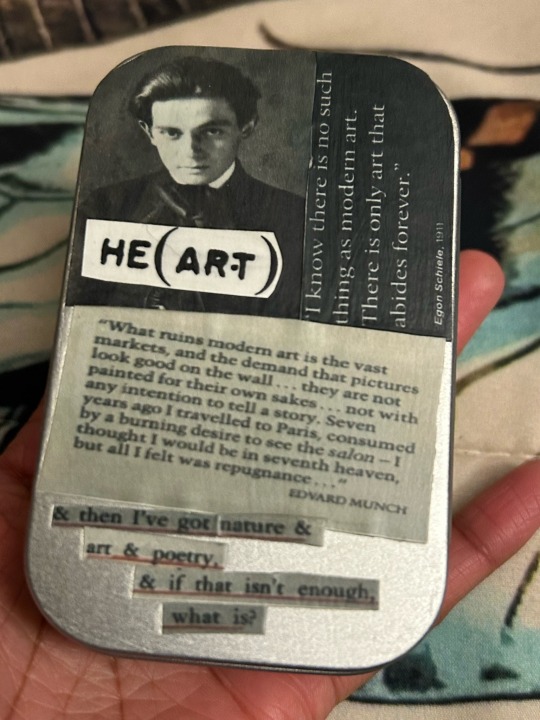

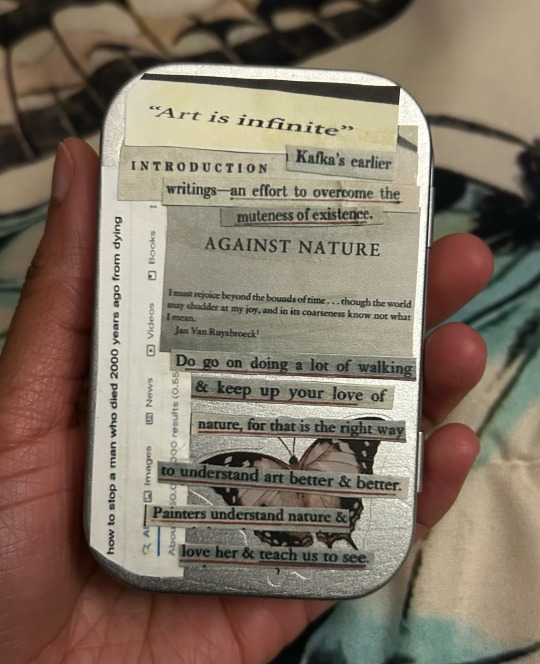
I could no longer resist the urge to make an altoid tin shrine for my inspirations. It long feels overdue
#egon schiele#edvard munch#charles baudelaire#wassily kandinsky#franz kafka#vincent van gogh#decadence#decadence philosophy#art theory#art philosophy#art psychology#existentialism#against nature#Karl Huysmans#altoid shrine#my art#dark acamedia#light acamedia#art history#art academia
86 notes
·
View notes